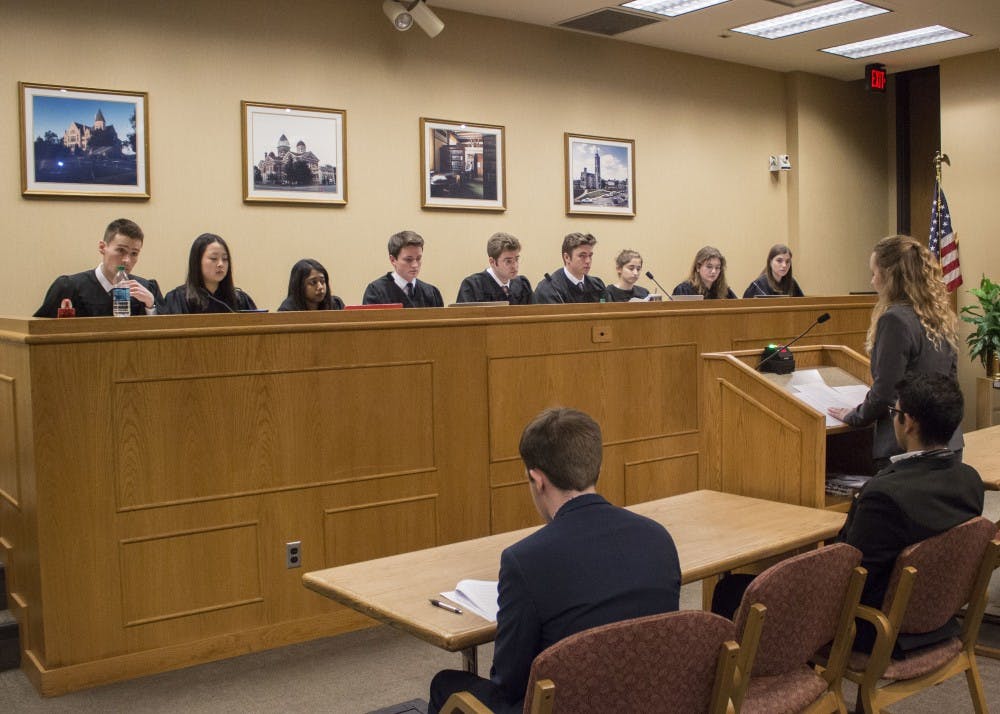Two IU Student Association Supreme Court decisions stand in the way of the official announcement of the winner of this year’s student government elections.
The Supreme Court met Monday night to reconsider two Election Commission decisions on complaints, one from Reform IUSA and the other from Voice IUSA. After hearing the statements, responses and conclusions in both cases, the court adjourned, stating they will release final decisions in the next 48 hours.
A total of 14 complaints were filed after unofficial election results projected Voice as the winner. 12 complaints were from Reform and two were from Voice.
The Election Commission met last Monday to discuss these complaints and make decisions based on the facts. Two of these decisions, one involving Voice's finances and the other the resignation of an executive on Reform's ticket, were appealed to the IUSA Supreme Court.
During the appeal hearings, the role of the Election Commission was called into question. Campaigns examined the commission’s decision-making, particularly with the inconsistencies in their use of previous election outcomes and rulings as guidance.
Reform made its case first, regarding Voice’s omission of seven donor email addresses in financial records. Emma Coates, Reform's presidential candidate, claimed the election codes had been violated seven times, and that each email should be counted as a separate penalty, adding up to a 35 percent total vote deduction.
"This was not one simple piece of information that was missing,” Coates said. “This was seven separate emails. This was seven separate donors."
Eight Election Commission members voted last Monday — they had four votes in favor of classifying the omission as a clear error, which would double the penalty to a 70 percent deduction, and four abstentions.
Election Commission Chair Savannah Wormley, who had abstained from voting, responded to Reform's statement and said that expecting Voice to track down every donor’s email address, which isn’t recorded by platforms like GoFundMe, would have been exceptionally difficult.
Wormley also said the commission’s role should be to ensure a fair election rather than to strictly enforce the election code, which was why she abstained from the vote.
The commission, she said, has been responsive rather than preventative in deciding the rules, for better or for worse. That's why a lot of these code changes happen after examining what went wrong in previous years, and then the commission continues from there, Wormley said.
The justices questioned this, asking whether it would be wise for them to look more closely at the precedent set by earlier court cases and election results to decide what to do in the future. While she was testifying, Wormley agreed, but she maintained her position.
"I think that a major vote deduction is anything but fair,” Wormley said.
After a five-minute recess, Voice candidates took the stage and explained why Reform should be disqualified. Reform’s treasurer resigned after the voting period ended, so the group added a new treasurer to the ticket.
Former Reform treasurer Evan Castle resigned after disagreeing with how the campaign was run, among other reasons, according to Voice vice presidential candidate Maggie Hopkins. Raegan Davis, who was originally on the Unite IU ticket, was written in to replace him.
Unite's ticket didn't submit a final report and did not wish to challenge the election's results.
Hopkins and Voice presidential candidate Alex Wisniewski brought up the question of what constitutes an election cycle. Whether it was from the time campaigns are announced to unofficial or official election results was unclear, they said, but the fact that a new treasurer was chosen after voting closed meant students were unable to properly vote in the election.
This is important, Hopkins said, because that means current rules about who can resign from an executive ticket and when are unclear.
Hopkins said the circumstances can exist in a gray area, but this case was clearly not an extenuating circumstance, such as an illness or death in the family. This was something else that was less excusable, she said.
Voice also brought up a 2013 IUSA Supreme Court Case, SPARC v. Election Commission, which was used by Wormley and the rest of her commission to make this decision.
The SPARC decision determined good cause for vacating an executive ticket, but Voice said they believed this case couldn’t be applied, because the facts differed. This case dealt with why the executive ticket candidate had to be replaced, but not the time constraints for when it could happen.
In addition, Wisniewski and Hopkins said, if all campaigns were still going on, Davis was still technically a member of the Unite ticket. Even though Reform had a few days to replace the treasurer, they could have picked anyone else and have been in less of a contested situation, Hopkins said.
"She was the only person on campus who was disqualified for that role,” Hopkins said.
During the conclusions, Davis rose from the audience and stated she had the intention to resign as Unite’s treasurer, after asking the justices if that would make a difference. Hopkins responded with a request to have that intention stricken.
The justices said they would consider that, along with the other arguments in their final deliberations. The results of these appeals should be released within the next few days.




